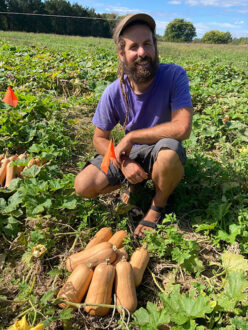LOUISA, Virginia – Virginia farmer Edmund Frost is on a mission to develop the ideal butternut squash: a disease-resistant prolific producer of consistent shape and size with unparalleled taste. Or maybe a few ideal varieties.
Since 2013, Frost, who started the seed company Common Wealth Seed Growers in 2014, has received funding from the Southern Sustainable Agriculture Research and Education (SSARE) for research and breeding work with butternut squash. His projects have involved side-by-side comparisons of dozens of existing varieties of butternut and tropical pumpkins (all from the species Cucurbita moschata), as well as selecting from populations made by crossing standout varieties. Simply put, the breeding strategy is to incorporate the eating quality and fruit shape of temperate butternut varieties with the resistance to downy mildew (the No. 1 limiting factor of cucurbit production in the South), and other desirable traits present in many tropical pumpkins.
“The goal of the breeding and research work I do has been to create a more vibrant seed system in our region,” said Frost, who’s always had a passion for breeding and seed saving, and has been conducting squash work for nearly a decade. “In order to have healthy and sustainable seed production, all the elements of a seed system are important: production, variety trials, selection work that improves and maintains existing varieties, and breeding new varieties.”
The initial SSARE-funded Producer Grant projects (FS13-273, “Identifying and Marketing Quality Open-Pollinated and Organic Cucurbit Seedstocks in Virginia,” and FS16-291, “Winter Squash Evaluation and Improvement for Downy Mildew Resistance and Fruit Quality”), involved extensive variety trials, as well as selection work from a cross Frost made early on between Seminole Pumpkin (from Florida) and Waltham Butternut (from Massachusetts). The outcome of that work resulted in the development of a butternut variety called South Anna, named after a river near Louisa, VA. Though South Anna has been available through Common Wealth Seed Growers since 2017, Frost has continued to select and improve the variety every year.
“The downy mildew resistance, yield and eating quality has stood out with farmers,” said Frost. “However I realized that more information was needed to really assess its potential in the region in comparison to other varieties.”
The most recent SSARE-funded project (FS20-325), “Breeding and Evaluation of Butternut Squash Varieties for Southeast Organic Farms,” has involved evaluating and developing new seedstocks made by crossing South Anna with other varieties, from both tropical and temperate origins.
So far, two new seedstocks stand out for Frost: a cross between South Anna and a Guatemalan Ayote squash that is often green on the inside; and a cross between South Anna and JWS 6823 (a butternut bred by Johnny’s Seeds).
“The Guatemalan variety has good eating quality, good disease resistance, and keeps really well. Something I realized in our 2020 trials is that South Anna doesn’t have as good keeping quality as I’d like it to. So this can help improve that. Plus it’s an unusual looking squash. I’m excited to be working with it,” said Frost. “As a side project I think it would be interesting to have a squash that has the common butternut squash color on the outside, but when you cut it open, it’s green on the inside.”
Frost first crossed the JWS 6823 variety with South Anna in 2015. Since then, it’s been backcrossed with South Anna twice to where the seedstocks are 25% and 12.5% JWS 6823, the rest South Anna. “It produces really well and looks good, and has a smoother texture and nuttier flavor than South Anna,” said Frost. “It’s also a smaller size. I’m thinking of doing an early release of it this year.”
Frost said his ultimate goal is to produce a variety, or two or three, that keeps the good downy mildew resistance in South Anna, but offers other desirable characteristics like improved keeping quality, more uniformity, different sizes, and different flavor profiles.
South Anna has become a popular butternut squash variety for farmers. Last year Common Wealth Seed Growers sold 45 pounds of seed. This year, they are on track to sell 75 pounds.
“I didn’t want to narrow the genetics too much in South Anna for fear of inbreeding depression (the opposite of hybrid vigor),” said Frost. “When you narrow the genetics too much, you can start to see problems, such as loss of disease resistance or low production. So I’ve kept South Anna a bit variable in terms of fruit shape and size. But where I’ve brought in other genetics through crosses, I think there’s enough diversity there to make tighter selections for one or two generations.”
As part of the current project Frost also compared South Anna with several commercial hybrid butternuts: Atlas, Avalon and Quantum. He found that Avalon showed good eating quality but poor downy mildew resistance; Atlas and Quantum had downy mildew resistance comparable with South Anna but poor eating quality, and problems with splitting (for Atlas). Quantum had better keeping quality than South Anna, though.
“The information gathered in this comparison will be helpful to farmers as they choose which varieties to grow. It has been helpful to us in identifying that improving keeping quality in South Anna and derivatives is a need, and that we are doing well on eating quality compared to commercial hybrids,” said Frost.
All of the work with butternut squash has been conducted at Twin Oaks Seed Farm and Care of the Earth Farm – on certified organic land, with minimal pest and disease control inputs. As a result, the selections are well suited to survive the pest and disease challenges that Southeast organic growers face. This also stands to benefit conventional growers by reducing the need for chemical inputs.
View Related SARE Grants:
- Breeding and Evaluation of Butternut Squash Varieties for Southeast Organic Farms (FS20-325)
- Winter Squash Evaluation and Improvement for Downy Mildew Resistance and Fruit Quality (FS16-291)
- Identifying and Marketing Quality Open-Pollinated and Organic Cucurbit Seedstocks for Virginia (FS13-273)
